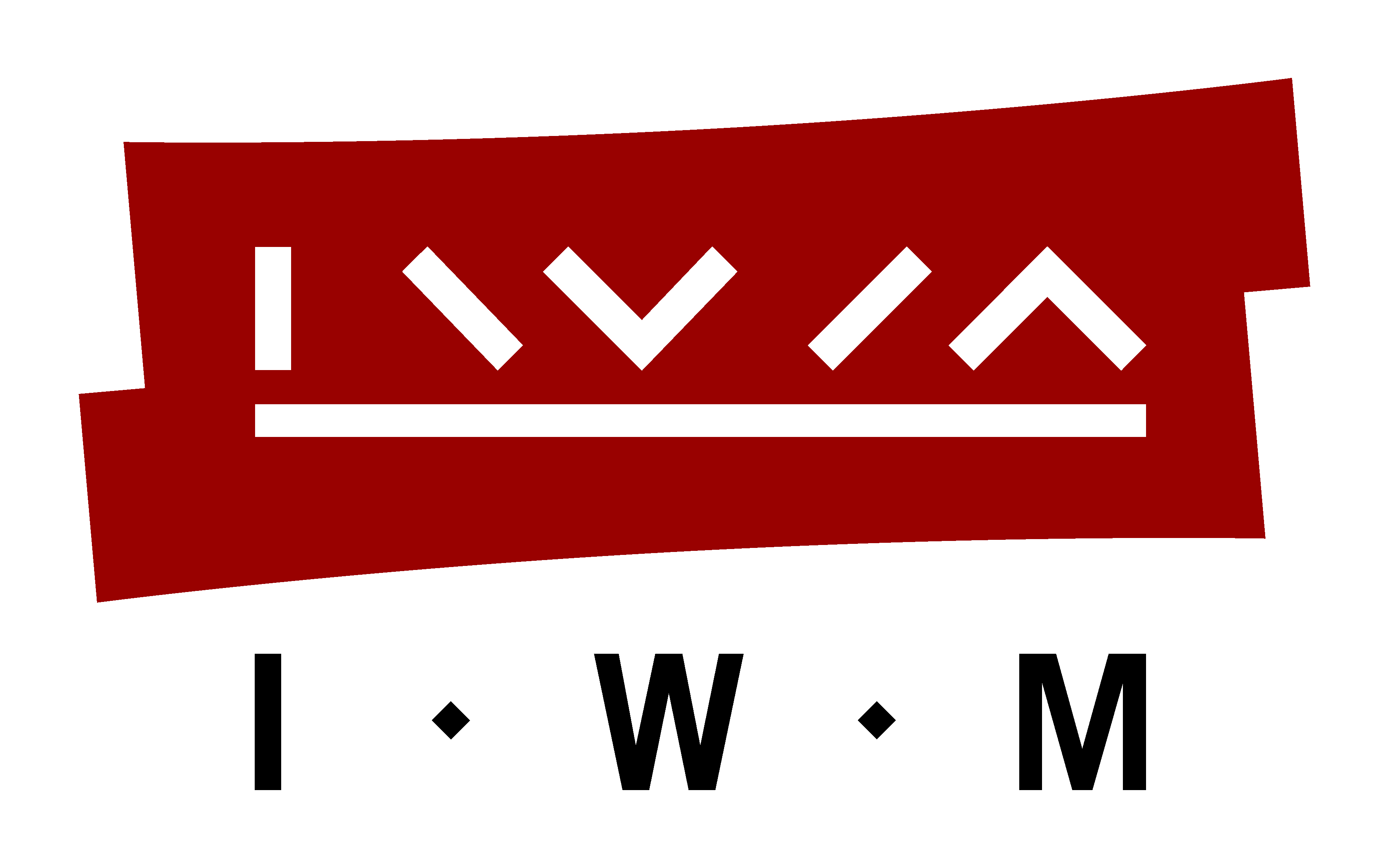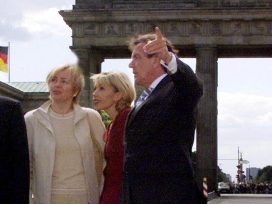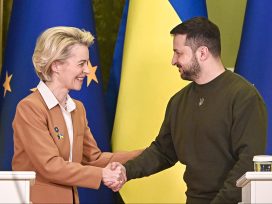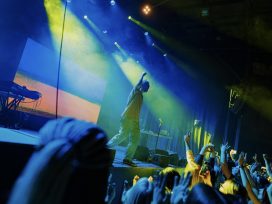The autumn of nations 1989 and the Ukrainian winter 2013-14
Putinism is not communism, yet it seems that many in the West are willing to understand and even accept Moscow’s actions. So how firm will the West’s stance be in protecting the foundations of European security subverted by Putin’s actions in Ukraine?
The “Autumn of Nations” as metaphor for the fall of communism in Europe plays on the reference to the revolutions of 1848 as the “Spring of Nations”. “Autumn” stands for the “end of history”, the political maturity of the central and eastern European nations and their eventual “return to Europe”. Yet seasonal metaphors can be ambiguous when applied to the Ukrainian political crisis that began at the end of 2013, and to Russia’s subsequent annexation of Crimea and subversion in eastern and southern Ukraine. In Moscow, pro-Russian separatist movements in Ukraine have been called a “Russian spring”1 – the beginning of a new gathering of the “ethnic Russian lands”. The metaphor of “autumn”, meanwhile, fits the dominant Russian discourse on Europe as an aging and decadent civilization that has lost its indigenous values and power instincts. This confusion of metaphors reveals nothing less than the crisis of the post-1989 European order. Prospects of a new Cold War2 are becoming real and a fully-fledged military conflict at the centre of the European continent no longer seems impossible. From this perspective, we should look back and reassess the meaning of 1989 and its consequences on recent European history.
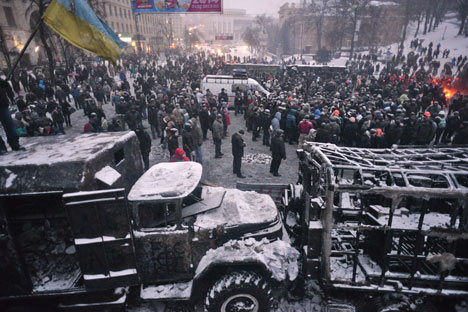
View of Dynamivska Street, Euromaidan protests. Events of 21-22 January 2014. Photo: Soerfm. Source:Wikipedia
The triumphal narrative of 1989 presents the revolutions in Poland, Hungary, East Germany, Bulgaria, Czechoslovakia and Romania as a wave of civil resistance and broad popular opposition to the local communist regimes. This narrative, however, often obscures the fact that the fall of these regimes was only possible because Moscow’s grasp on its satellites had weakened. The liberal fraction of the Soviet ruling elite, led by Mikhail Gorbachev, believed that confrontation between the two political blocs should cede to a “common European house” reaching from the Atlantic to Vladivostok. Forcing loyalty from the central and eastern European Soviet “brother states” became too costly for Moscow both politically and economically.
This is even more true of the former Soviet republics, where the end of communist rule finally arrived in 1991 hand in hand with national independence. As part of the same chain reaction, political changes in the (post-)Soviet space were not a home-grown phenomenon but the result of the collapse of the imperial centre. With the exception of western Ukraine and the Baltic states, there was neither a mass opposition movement in these countries, nor did the end of communist rule bring significant change in the governing elites. Hopes for democracy, freedom and prosperity drowned in a wave of Soviet nostalgia. Even if the declarations of state independence in 1991 entered the official calendars, a myth of national revolution comparable to the ’89 revolutions in east central Europe is largely absent in the post-Soviet space. The “Orange Revolution” in Ukraine in 2004 was proclaimed the “birth of a nation”, but this myth faded after only a few years. While the “Ukrainian winter” of 2013-14 marks a more profound shift in the country’s political culture, it remains to be seen whether the promise of the “Third Republic” as revival of the Ukrainian project will be fulfilled.
1991 as a political symbol and site of memory is even more problematic in post-Soviet Russia. The initial meaning of August 1991 as the birthdate of a new democratic Russia and liberation from Communist rule has been gradually transformed into a symbol of defeat and unconditional surrender to the West – or, in Putin’s words, the “greatest geopolitical disaster of the twentieth century.” Russia’s annexation of Crimea and its continuing aggression towards Ukraine sealed this negative interpretation of 1991 as the point in contemporary Russian history when “everything went wrong.” According to Fyodor Lukyanov, editor-in-chief of Russia in Global Politics, what Putin is doing today is attempting to return to 1989/91 and alter the post-Cold War European order, in which Russia has de facto been a defeated country.3
The topos of the ’89 Revolutions has meanwhile become a cornerstone of the narrative of a united, post-Cold War Europe. No wonder, then, that the “Ukrainian winter” of 2013-14 is often seen as a delayed revolution aimed at completing the post-communist transition. It started as a mass movement in support of the pro-western course and in opposition to the decision of the Ukrainian government to postpone the signing of the Association Agreement with the European Union. Although the agreement offered Ukraine no prospect of EU membership, for many in the country it was the Ukrainian equivalent of a “return to Europe”. The successful post – communist transitions in east central Europe have inspired Ukrainian westernizers for more than twenty years, and the Euromaidan was perceived as a catalyst for similar revolutionary change. Lenin monuments toppled across the country – except in the west of the country, where they had already been removed in 1991, and in Donbas and Kharkiv, where they survived the Euromaidan. Demands to ban the Communist Party and communist symbolism, as well as calls for lustration, seem like déjà vu of the early 1990s.
However, even if the Ukrainian “Revolution of Dignity” in some sense resembles the revolutions of ’89, the authoritarian kleptocracy of Yanukovych and his clan can hardly be compared to the former communist regimes in eastern Europe. The latter’s legitimacy was based on a universalist political ideology and the claim to represent the popular will; faced with mass protests and public denunciation of the official ideology, they immediately collapsed. At the end of 2013, protesters in Ukraine gathered in huge numbers on the streets of Kyiv and other cities week after week; they camped overnight in the winter cold singing the Ukrainian anthem; they built a whole city with its own self-governing structure, in the centre of Kyiv. And yet, these protests – the largest in Europe for twenty-five years – did not impress the Yanukovych regime. It turned out that peaceful protest could simply be ignored; that a regime without an ideology need not fear the truth and is thus more difficult to bring down. The Ukrainian revolution was not “velvet”: violence changed the mode of the protest and after the massacre in the centre of Kyiv, any compromise with the regime was impossible. This violent turn, together with the counter-revolution supported by Russia and the subsequent Russian violation of Ukrainian national sovereignty, make the events of 2013/14 in Ukraine very different from the triumphant revolutions of ’89.
While for many observers the Lenin monuments appear as markers of a Soviet identity that has survived in the economically depressed industrial enclaves of the Ukrainian East, what the Kyiv government is currently confronted with in Donetsk, Luhansk and Kharkiv has, in my opinion, little to do with Soviet ideology and values. Rather, what we are dealing with is what the Russian sociologist Lev Gudkov ten years ago called “negative identity”.4 This identity operates primarily with the category of the “enemy”. From the perspective of pro-Russian protesters, it is “banderists” and “nationalists” from Kyiv and western Ukraine that threaten to steal “our past” and destroy “our monuments”. The Lenin monuments have become a site and symbol of pro-Russian mobilization – “empty signifiers” that carry no ideological value but mark the local identity as “anti-Kyiv”.
As the fear of a new Cold War begins to haunt the West, the question of the nature of Putin’s regime and its aspirations becomes all the more pressing. Aleksandr Etkind argues in a recent article that Putin’s actions in Ukraine should be understood as a preventive counter -revolution, an attempt to halt Maidan-type protests at the Russian border.5 Etkind nevertheless denies historical continuity between Putinism and Stalinism. Indeed, despite the abuse of human rights and political freedoms, the massive and manipulative propaganda effort and the incitement against a “fifth column”, Putin has hardly been able to build a totalitarian system, still less impose it on Russia’s neighbours. Putin’s Russia is integrated into the global economy; its political and business elites see the West as a place to stash away their money, educate their children and spend their holidays. Despite Putin’s ambition to become the world leader of anti-western conservatism, Russia is not going to be able to challenge the West ideologically and has no desire to lead the planet. In the contemporary multipolar world, a Cold War bipolar architecture can no longer work.
And yet, the phantom of the Cold War is present in current Russian politics as a collective geopolitical trauma that motivates the seemingly irrational, politically and economically costly decisions of Putin’s leadership. As the West prepares to celebrate the 25th anniversary of the post-Cold War order, from the Russian perspective it seems that the Cold War never really ended, at least not with a fair deal. Instead, Russia was forced to capitulate and give up its geopolitical interests in exchange for the vague promise of being treated as an equal. Russia’s ruling elite no longer wants to hide its dissatisfaction with the rules of game. However Putin’s Russia is returning not to the Cold War but to the realpolitik of the nineteenth century and the language of power politics, strategic interests and spheres of influence. From the Russian perspective, the US never stopped conducting this type of realpolitik, while the post-Cold War European Union is a curious but unviable project that will inevitably be undermined by nationalist forces. No wonder Moscow counts on radical rightwing (and leftwing) European opponents of the EU project, who enthusiastically support Putin’s actions.
The danger posed by Russian politics is not so much that of a fully-fledged Cold War, but the return of the ghosts of revanchism and nationalism that haunted Europe in the 1930s; of territorial annexations and border realignments under the pretext of the defence of linguistic minorities and “compatriots” in neighbouring countries. Then as now, such a politics can easily lead to a real war. Over the last twenty years, concerns have often been raised that Moscow might use the Russian-speaking populations in post-Soviet countries in the same way that Hitler used the ethnic Germans in interwar Europe. In the 1990s, however, Russia was too weak and unstable to play the ethnic card across its borders, occupied as it was in fighting its own ethnic nationalisms and separatist movements, most notably in Chechnya. Moscow’s strategy in the post-Soviet space was Eurasian integration, which seemed to follow a similar logic to the EU project. Post-Soviet integration was by no means free from power politics and evidently served Russian interests in the “near abroad”; but at least it did not aim at the destruction of neighbouring states. The annexation of Crimea and the threat to use all means necessary, including military intervention, to protect the rights of Russians and Russian speakers in Ukraine, indicated that the Kremlin prioritizes the violent “gathering of ethnic lands” over interstate integration. In other words, Europe is not regressing back to Cold War conditions (when nuclear parity guaranteed the inviolability of borders) but – at best – sliding into nineteenth-century power politics or – at worst – into the world of untamed nationalist ambitions and total mistrust that led to the Second World War.
Will Putin unwillingly unite the West, which in the past decade has drowned in contradictions and quarrels and forfeited global political leadership? Can his aggressive politics breathe new life into NATO and force the EU to overcome its energy dependency on Russia? How firm will the West’s stance be in protecting the foundations of European security subverted by Putin’s actions in Ukraine?
Putinism is not communism, yet it seems that many in the West are willing to understand and even accept Moscow’s actions. Putin speaks the language of realpolitik , and while European leaders might despise his political style, they all too often acquiesce to his arguments.

See, for example, rusvesna.su
Vladislav Inozemtsev, "How to win Cold War II?" in: Eurozine, 28 March 2014www.eurozine.com/articles/2014-03-28-inosemtsev-en.html
Fedor Lukyanov, "Vozvrashchenie na razvilku 1989-go", Gazeta.ru, 3 April 2014, iphone-rss.gazeta.ru/comments/column/lukyanov/5978717.shtml
Lev Gudkov, "Negativnaia identichnost", NLO 2004
Aleksander Etkind, "Eine präventive Konterrevolution", www.nzz.ch/meinung/debatte/eine-praeventive-konterrevolution-1.18275438
Published 13 June 2014
Original in English
First published by Tr@nsit Online and Freedom Express
Contributed by Transit © Tatiana Zhurzhenko / Transit / Eurozine
PDF/PRINTNewsletter
Subscribe to know what’s worth thinking about.
Related Articles
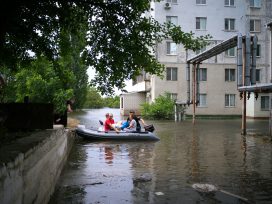
The Ides of March
Ecocide in Ukraine
The immediate need for environmental protection and reparation in war-torn Ukraine has entered the country’s peace plan. Legislative revisions, recognizing ecocide, and thereby advancing the rule of law globally, expand what it means to develop responsible governance of the ecosystems that sustain us.

On top of housing, work and schooling, Ukrainian refugees with HIV face an additional, urgent difficulty: how to access the antiretroviral medicines they need to suppress the virus. In Poland, they face a particular stigma, causing many HIV positive refugees to conceal their health status.
